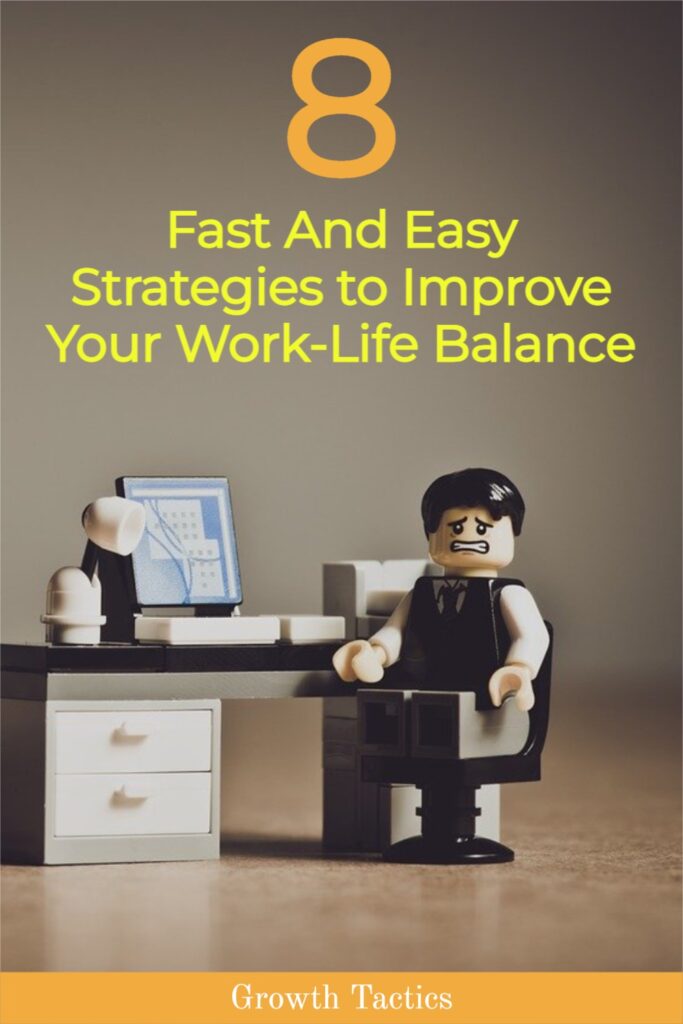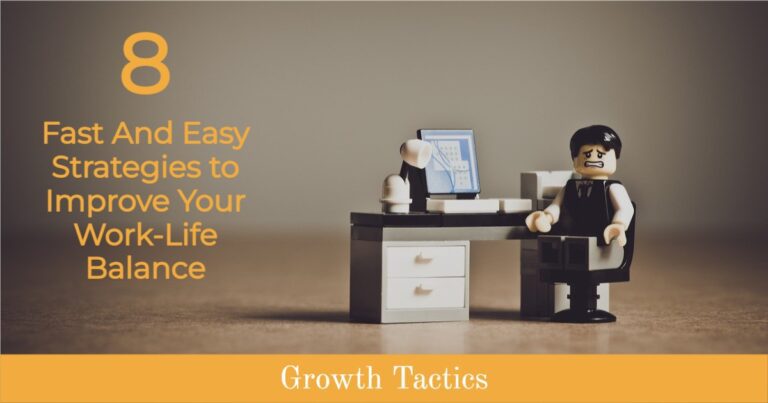Have you ever felt that your work and personal life are out of balance? It’s a common problem. Most people, including me, feel this way at times. This article will give you a few ways to improve your work-life balance and be happier than ever.
Jump To Section
Why is a good work-life balance important?
You’re more than your work. You’re a whole person with hobbies, relationships, and dreams. When you have time for things you love, you feel more alive. This isn’t selfish; it’s smart.
Think about it. When you’re always working, you miss out on life’s good stuff. Family dinners, catching up with friends, or just quiet time to recharge. These moments help you grow as a person.
Here’s the crazy part, a good balance actually makes you better at your job. When you’re rested and happy, you bring your best self to work. You’re more creative, and focused, and get more done.
Your health gets better too. Less stress means you’re less likely to burn out or feel sick. You’ll have more energy to do your tasks and reach your goals.
Remember, everyone’s balance looks different. What works for your co-worker might not work for you. That’s okay. The key is finding what fits your life and what you want.
Take a look at how you spend your time. Are you making room for what really matters? If not, it’s time for a change. Your future self will thank you.
In the end, a good work-life balance helps you live a fuller life. It’s about being a whole person, not just a worker. And that’s something worth going after.
So, find your balance. It’s not always easy, but it’s worth it. Let’s get into some ways you can do just that.
Get rid of your commute

One thing you can do to achieve a better work-life balance is simply eliminate your commute. We waste so much precious time every day stuck in traffic, watching the minutes tick by as we slowly move closer and closer to our destination. It’s time that could be spent on more important things like spending time with your family, going for a hike, or reading a book you’ve been meaning to get around to.
If your company allows you to work from home one or two days per week, that’s a great start. If they don’t allow it at all, consider moving closer to work if you can afford it.
I recently made this decision myself and I can honestly say I’ve never been happier! Not only do I get an extra 45 minutes of sleep every morning (and when you have kids, every minute matters!), but I also enjoy my lunch break much more because I know that even if there is no money in my wallet I can always just go home and make something quick.
Trust me, it’s not that important
As we’ve discussed, a work-life balance is not an easy goal to achieve. But one thing you can do to make the process of finding that balance easier is to prioritize your goals and learn to let go of things that simply aren’t important.
- Use the 80/20 rule when prioritizing. This rule states that 20% of your activities will account for 80% of what you accomplish. In other words, 80% of your work won’t matter in the long run. You can apply this information by focusing on the 20%, or what’s most important, and then letting go of the rest if you begin to feel too overwhelmed with responsibilities.
- Write down your priorities at home and at work so you have a record to look back on when you’re feeling stressed out. If there’s something you need help with, don’t be ashamed. Asking someone else for assistance is a sign of strength rather than weakness!
See Related: 14 Easy Tips on How to Be More Productive
Give yourself permission to disconnect at a set time every day

The most important thing you can do to improve your work-life balance is to give yourself permission to disconnect at a set time every day. This might mean turning off email notifications or powering down your computer when you leave the office.
If that sounds too difficult for you, consider steps like setting up an auto-reply message in Outlook during your office hours and forwarding all calls after 5 p.m. to voicemail so that people know not to expect an immediate reply from you outside of those hours.
By letting people know ahead of time that they shouldn’t expect immediate replies from you outside of working hours (and what constitutes something “urgent”), you can help avoid unnecessary stress on both sides in the long run.
And if it’s everyone else who seems unwilling (or unable) to respect your boundaries? The easiest way to deal with workplace culture like this is simply not to participate in it. Even if that means looking for a new job where your company values can align better with yours.
Don’t be afraid to ask for what you need
One of the most common regrets people have on their deathbeds is that they didn’t ask for what they wanted. That’s why it’s critical, to be honest with yourself and your employer about your desires.
If a flexible schedule will make your life easier, try asking for more autonomy at work or for an extra day off. You may find some of these solutions are easier to come by than others. You’ll just have to be willing to explore different avenues until you find one that works.
A common theme in many of these strategies is making sure you’re communicating your needs effectively and without fear. At worst, an employer may say no. If true work-life balance is important enough to you, don’t let a no stop you from trying again in the future or working towards one of the other solutions outlined above.
Learn to say no when it’s appropriate to balance work and life

Of course, saying no is also an important skill when it comes to managing your own time.
“At work, we’re asked to do so many things and there’s only so much bandwidth,” says Lauren Cielo, founder of Golden Proportions Financial and the author of The Student Loan Planner. “You have to turn down a lot of things or at least delay them.”
Saying no in this context will look different than it does in your personal life. There are three key factors that determine whether you should say yes or no:
- How important is the task? Is it fulfilling a goal that’s critical to you and your career? Is it something you’ve been looking forward to being able to accomplish?
- What resources are required? Do you have all the information you’ll need to complete the task on time and within budget? Are there any external factors that threaten your capacities for success, such as financial constraints or limited access to team members during crucial periods of the project cycle?
- Who’s asking for this item on your plate? Will declining it be detrimental to an important relationship? For example, with a boss or colleague whose opinion has significant sway over your own career trajectory?”
Take your lunch and other breaks
Take your lunch and other breaks. In a lot of cases, taking a break from work makes you more productive in the long run. Taking an uninterrupted, 30-minute lunch break is both good for productivity and your overall health.
But if you feel that leaving your desk will leave you with too much to catch up on or make it look like you’re not working hard enough, start small. Take a 10-minute walk around the block once every hour or so and eat at your desk, but focus solely on eating during that time; don’t answer emails or hop back onto Slack channels.
Be present in your life; don’t feel guilty about being there
You may be tempted to try to fix your work-life balance by changing your job or cutting back on activities in your life. While those can be good options, they’re not always possible, and they don’t consider the basic premise of the problem: that you need to stop placing so much value on work and start placing more value on life.
One of the best ways to do this is simply by being present in your life rather than feeling guilty about where you are. It’s a psychological trick, if you replace guilt about the time spent at work with positive feelings about being home, then the home becomes more meaningful no matter what’s going on at work.
There are many ways to stay centered and present in everyday life; some people find meditation helpful while others like exercising or simply jotting down their thoughts every day.
But one thing everyone can do is try to spend as much time as possible with other people (in real life!) instead of spending time attached to electronic devices that connect them with distant colleagues or friends who aren’t present in their lives. Taking time out of each day for relaxation, sleep, healthy eating, and exercise will also help keep you grounded.
Stay Organized to maintain a Strong Work-Life Balance
Achieving a healthy work-life balance is closely tied to staying organized. Utilizing tools such as calendars, to-do lists, and reminders can significantly streamline your work and personal commitments, allowing you to manage your time more effectively. Implementing specific strategies can make a considerable difference in how you maintain a balanced lifestyle.
One effective strategy is to choose either a digital or physical calendar to consistently update your work deadlines, appointments, and personal events. This will provide a clear overview of your schedule and help you plan your days more efficiently.
Additionally, beginning each day with a to-do list that outlines your tasks and priorities for both work and personal life can help you stay focused and ensure that you allocate time for essential tasks and activities.
Organizing your tasks into categories such as work, personal, errands, and leisure allows you to prioritize tasks and allocate time effectively, ensuring that all aspects of your life receive attention. Utilizing reminders and deadlines ensures that you stay on track with your tasks and commitments, preventing procrastination and maintaining focus on achieving your goals.
Productivity apps can assist you in staying organized and managing your time more efficiently. Some popular options include Trello, Evernote, and Todoist. Scheduling personal time is as crucial as scheduling work tasks and appointments. Allocating time for personal activities and self-care ensures that you maintain a healthy balance between your professional and personal lives.
Establishing daily and weekly routines that encompass both work and personal activities can help you stay organized and maintain a sense of structure in your life. Periodically assess your organizational strategies and make adjustments as needed. This allows you to optimize your time management techniques and ensure that you’re maintaining a healthy work-life balance.
By staying organized and effectively managing your time, you’ll be better equipped to juggle your work and personal commitments, ultimately achieving a harmonious work-life balance.
Reflect and Adjust as Needed
Recognizing the importance of regularly reassessing and adjusting your work-life balance is crucial for achieving a healthy equilibrium. As life circumstances, goals, and priorities change over time, it’s essential to adapt and make necessary adjustments to maintain a balanced lifestyle. This ongoing process requires self-awareness, flexibility, and a commitment to personal well-being.
One key aspect of reassessing your work-life balance is to accept that change is inevitable. Whether it’s a new job, a growing family, or shifting personal interests, these changes can impact your priorities and the way you allocate your time. Embrace these changes and be willing to adapt your schedule and routines accordingly.
Another important element is consistent self-reflection. Regularly evaluate your current work-life balance by examining your stress levels, satisfaction with your personal and professional life, and the quality of your relationships. This self-assessment will empower you to identify areas that require attention and make informed decisions about necessary adjustments.
When implementing adjustments, focus on small, manageable changes that can have a significant impact. This might include delegating tasks, setting boundaries for work hours, or incorporating regular self-care activities into your routine. Monitor your progress and continue to refine your approach as needed.
Ultimately, maintaining a healthy work-life balance is an ongoing journey that requires continuous evaluation and adaptation. By embracing change, engaging in self-reflection, and making adjustments as needed, you can achieve a balanced lifestyle that fosters overall well-being and satisfaction in both your personal and professional lives.
With just a few small changes and some guidance from the right people, A Good work-life balance can become a reality
While it may not seem possible at first, there really is a way to achieve a Don’t let anyone fool you into thinking that a healthy work-life balance is a pipe dream while you’re in the midst of pursuing your career. With just a few small changes and some guidance from the right people, work-life balance can become a reality. And when it does, you’ll wonder why you ever thought it was impossible.
When top professionals are asked how they manage their time more effectively, they often say three things:
- Stop trying to do everything
- Hire help if you can afford it
- Delegate tasks that don’t require your expertise
Did you find this article on how to improve work-life balance useful? Please share and subscribe below.


